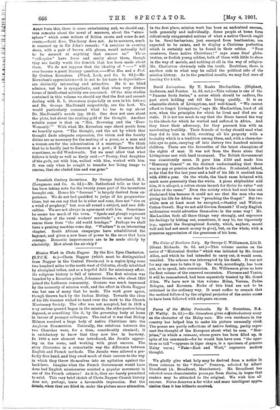Mission Work in Chota Nagpur. By the Rev. Eyre Chatterton.
(S.P.C.K. 4s.)—Chote, Nagpur (which must be distinguished from Nagpur in the Central Provinces) is a region lying some two hundred miles to the north-west of Calcutta, chiefly inhabited by aboriginal tribes, and so a hopeful field for missionary effort. Its religious history is fall of interest. The first mission was founded by a Bavarian priest, Johannes Gossner, who about 1820 joined the Lutheran community. Gossner was much impressed by the necessity of mission work, and the effort in Chota Nagpur was but one of many that he made. The work grew apace, though thrown back by the Indian Mutiny. Towards the close of his life Gossner wished to hand over the work to the Church Missionary Society. The offer was not accepted, but in 1868 a very serious quarrel began in the mission, the older pastors being deposed, or something like it, by the governing body at home in favour of younger colleagues. The end of it was that Bishop Milman received a large body of native Christians into the Anglican Communion. Naturally, the relations between the two Churches were, for a time, considerably strained ; it is satisfactory to know that they now live in harmony. In 1880 a new element was introduced, the Jesuits appear- ing on the scene, and working with great success. The story illustrates in a remarkable way the difference between English and French methods. The Jesuits were allowed a per- fectly free band, and they owed much of their success to the way in which they threw themselves into an agitation against the land-laws. Imagine what the French Government would have done had English missionaries assisted a popular movement in one of the French colonies ! As it is, they are barely permitted to exist. This very brief sketch of Chota Nagpur Church history does not, perhaps, leave a favourable impression. But the details, when they are filled in. make the picture more attractive. In the first place, mission work has been an undoubted success, both generally and individually. Some people at home form ridiculously exaggerated notions of what a native Church ought to he. Semi-barbarians, just emerged from heathenism, are expected to be saints, and to display a Christian perfection which is certainly not to be found in their critics. "Poor creatures, these native Christians !" says some blasé globe- trotter, or foolish young soldier, both of them with little to show in the way of morals, and nothing at all in the way of religion. Mr. Chatterton obviously tells the truth. Doubtless, there is another side to what may be called the political side of the mission history. As to the practical results, we may feel sure of hearing the truth.










































 Previous page
Previous page